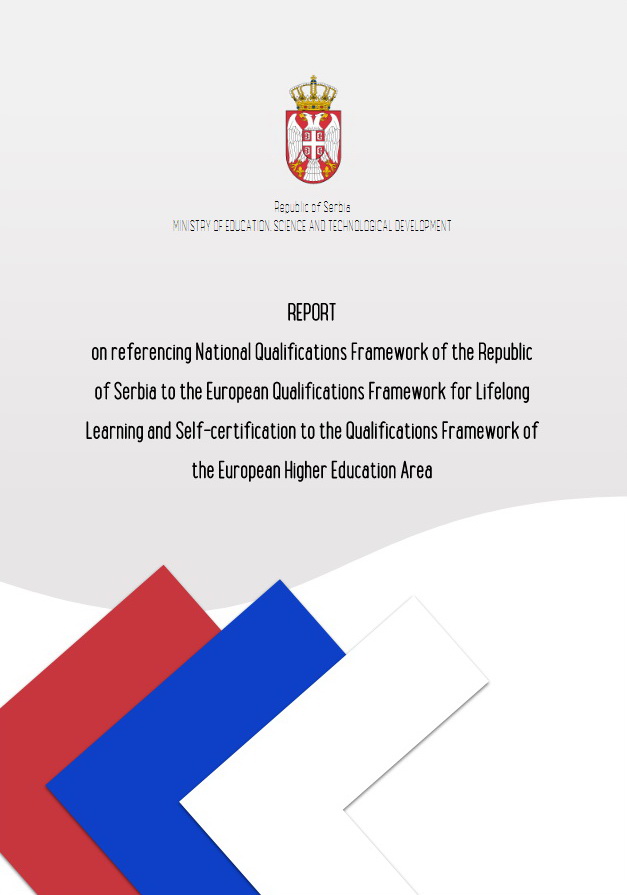 The Social Inclusion and Poverty Reduction Unit of the Government of the Republic of Serbia provided support to the Ministry of Education, Science and Technological Development, within the project “From Education to Employment – E2E”, which is being implemented with the support of the Government of Switzerland, in drafting the Report on Referencing the National Qualifications Framework of Serbia (NQFS) to the European Qualifications Framework (EQF). A supplementary Report on Self-assessment of the National Qualifications Framework of Serbia in the field of higher education to the Qualifications Framework in the European Higher Education Area (QF-EHEA) was prepared in addition to this Report. Through the adoption of the Report on Referencing the NQFS to the EQF, the qualifications framework of the Republic of Serbia has been referenced to the European Qualifications Framework, meaning that a clear and transparent relationship has been established between eight qualification levels in Serbia and eight qualification levels of the European Qualifications Framework.
The Social Inclusion and Poverty Reduction Unit of the Government of the Republic of Serbia provided support to the Ministry of Education, Science and Technological Development, within the project “From Education to Employment – E2E”, which is being implemented with the support of the Government of Switzerland, in drafting the Report on Referencing the National Qualifications Framework of Serbia (NQFS) to the European Qualifications Framework (EQF). A supplementary Report on Self-assessment of the National Qualifications Framework of Serbia in the field of higher education to the Qualifications Framework in the European Higher Education Area (QF-EHEA) was prepared in addition to this Report. Through the adoption of the Report on Referencing the NQFS to the EQF, the qualifications framework of the Republic of Serbia has been referenced to the European Qualifications Framework, meaning that a clear and transparent relationship has been established between eight qualification levels in Serbia and eight qualification levels of the European Qualifications Framework.
The Report on Referencing the National Qualifications Framework of Serbia to the European Qualifications Framework was adopted at the 52nd EQF Advisory Group meeting, which was held on the 4th and 5th of February 2020 in Brussels, and it was published on the web site of the European Commission on 24 September 2020.
Why and for whom is the EQF important?
- It supports employment and labour market mobility
Employers can better assess the qualifications of workers coming from other countries and institutions with which they are not familiar. Furthermore, employers can better assess whether learning outcomes meet the needs of the company in which the worker wants to be employed. This enables labour mobility and improves the supply and demand of the workforce in the labour market.
- EQF and NQFS help those who are in the process of learning to make decisions regarding further education and training
Referencing the NQFS to the EQF ensures trust between national qualification systems of different European countries, i.e. better information on the possibilities of continuing education and “movements” through education systems in different countries.
- It supports lifelong learning
Given that the EQF is based on learning outcomes, it is possible to take into account the experiences an individual would acquire beyond the formal education system, thus supporting lifelong learning.
- Recognition of non-formal education and informal learning in Europe
The European Qualifications Framework supports the evaluation of non-formal education and informal learning, which is a prerequisite for lifelong learning.
- The European Qualifications Framework also supports other EU tools for achieving transparency
The European Qualifications Framework also supports other EU tools for achieving transparency such as Europass, the European Credit Transfer and Accumulation System (ECTS) and the European Credit System for Vocational Education and Training (ECVET).
You can download the Report on Referencing the National Qualifications Framework of Serbia to the European Qualifications Framework from this link.
 Government of the Republic of Serbia
Government of the Republic of Serbia











 pdf [271 KB]
pdf [271 KB]
Leave a Comment